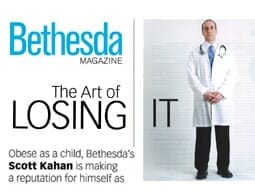By Kelly Theim Hurst, PhD
Stepping on the scale can be an emotional experience. At NCWW, we understand that weighing is a personal choice. It’s up to you whether to weigh (or not), how often to weigh, whether to share your weight with us, and so on. In fact, we have a policy at our office that encourages you to only record your weight if, or when, you choose. We want to empower you to feel ownership over your weight management plan, which includes learning about which strategies help or hinder your path to managing weight and health over the long-term.
So that said, let’s talk about some of the pros and cons of weighing. Some of what we know comes from a huge research project called the National Weight Control Registry, which is a survey of over 10,000 adults who have lost at least 30 pounds and kept it off for at least a year (for about 5 years, on average). From extensively polling these individuals, we have learned that many people who lose weight and maintain weight loss over the long term report that, among other strategies, they weigh themselves regularly. The reason is that regular weighing is a form of self-monitoring. Just like using a compass helps to objectively measure your direction and informs you whether to turn left or right, self-monitoring is a way of gathering data to learn more about your progress and inform your path.
However, there can also be potential drawbacks to self-weighing. For some people, stepping on the scale triggers lots of negative self-talk and uncomfortable emotions. If the scale doesn’t move, or the number moves in a way that is unexpected or unwanted, it can increase frustration and anxiety. Using the scale as the sole barometer of “success” can lead to overlooking or ignoring all the positive and healthful behaviors and outcomes that don’t show up on the scale. This is particularly unfortunate when the scale “lies” (i.e., when everything is going great but the scale doesn’t budge much ‒ or even goes up on a given day or week or month). And sometimes people feel obsessive about weighing, which can be unhealthy (and just plain unhelpful). Weighing multiple times per day, for example, could be a personal warning sign that you’re going down that path.
What does this mean for you? For starters, it doesn’t necessarily mean you have to step on the scale today. It doesn’t even mean you need to step on a scale at all. Many people can successfully improve their health and manage their weight using indicators other than the scale. For example, how much energy we have or how well we are sleeping can be important health markers. How our clothes fit can be a useful marker too.
However, if you’re trying to manage your weight but rarely or never weigh yourself, it might prompt you to take a look at why. If you’ve weighed yourself during some weeks but not others, why is that? It may be because you were traveling or just forgot. Or it may be because you’ve learned over time that it’s not a valuable tool for you.
But we often find that patients are hesitant to weigh themselves because they interpret the numbers as judgment, rather than just data. For example, commonly when people are struggling in their weight management path, they make statements (often in their own heads) like, “I already know I’m ‘off’ this week, so stepping on the scale will just make it worse.”
The number on the scale is just a number, just data. This data point is influenced by a host of factors, including how much water or sodium you’ve had lately, the time of day you weigh, the time of month (especially for women), what medications are you are on, and so on. The scale will not tell you a lot of other pieces of information, such as your overall health, energy level, mood, or the number of healthy choices you’ve made this week (or this year). Perhaps most importantly, the number on the scale will never – ever – tell you your worth as a person. Even if this concept is something you understand intellectually, as most of us do, it is worth reminding yourself often – “you” and “your weight” are not one and the same.
Despite the usefulness of measuring weight for many people, the way that regular self-weighing can sometimes hold us back is what we do with that number – namely, how it makes us feel. In any given moment, that number can send us down a negative path (e.g., “I worked hard this week only to gain back everything I lost!”), making us want to give up. However often you choose to weigh, doing it in a consistent way – first thing in the morning, after using the bathroom, and without clothes or shoes – is a good way to lessen the emotional roller-coaster that accompanies major ups and downs on the scale. And most importantly, know yourself. If getting on the scale leads you down an emotional path that is not helpful, then don’t do it! Let’s work together to see if weighing will be a useful tool for you personally, knowing that it is one tool of many that we have available.
As in the research world, measuring your weight (or blood pressure, cholesterol, etc.) is just data collection to help us understand where to go from here, and (at least when doing a large survey like the one noted above), having more data is usually better. Trying our best to treat today’s weight as what it is – just one data point among many – can help lessen the anxiety around self-weighing and empower us to use it as an effective tool for managing weight, rather than as a way to measure self-worth.









